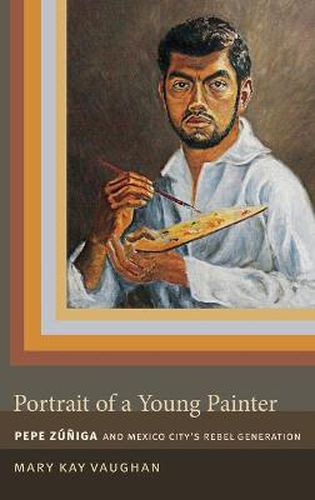Readings Newsletter
Become a Readings Member to make your shopping experience even easier.
Sign in or sign up for free!
You’re not far away from qualifying for FREE standard shipping within Australia
You’ve qualified for FREE standard shipping within Australia
The cart is loading…






In Portrait of a Young Painter, the distinguished historian Mary Kay Vaughan adopts a biographical approach to understanding the culture surrounding the Mexico City youth rebellion of the 1960s. Her chronicle of the life of painter Pepe Zuniga counters a literature that portrays post-1940 Mexican history as a series of uprisings against state repression, injustice, and social neglect that culminated in the student protests of 1968. Rendering Zuniga’s coming of age on the margins of formal politics, Vaughan depicts midcentury Mexico City as a culture of growing prosperity, state largesse, and a vibrant, transnationally-informed public life that produced a multifaceted youth movement brimming with creativity and criticism of convention. In an analysis encompassing the mass media, schools, politics, family, sexuality, neighborhoods, and friendships, she subtly invokes theories of discourse, phenomenology, and affect to examine the formation of Zuniga’s persona in the decades leading up to 1968. By discussing the influences that shaped his worldview, she historicizes the process of subject formation and shows how doing so offers new perspectives on the events of 1968.
$9.00 standard shipping within Australia
FREE standard shipping within Australia for orders over $100.00
Express & International shipping calculated at checkout
In Portrait of a Young Painter, the distinguished historian Mary Kay Vaughan adopts a biographical approach to understanding the culture surrounding the Mexico City youth rebellion of the 1960s. Her chronicle of the life of painter Pepe Zuniga counters a literature that portrays post-1940 Mexican history as a series of uprisings against state repression, injustice, and social neglect that culminated in the student protests of 1968. Rendering Zuniga’s coming of age on the margins of formal politics, Vaughan depicts midcentury Mexico City as a culture of growing prosperity, state largesse, and a vibrant, transnationally-informed public life that produced a multifaceted youth movement brimming with creativity and criticism of convention. In an analysis encompassing the mass media, schools, politics, family, sexuality, neighborhoods, and friendships, she subtly invokes theories of discourse, phenomenology, and affect to examine the formation of Zuniga’s persona in the decades leading up to 1968. By discussing the influences that shaped his worldview, she historicizes the process of subject formation and shows how doing so offers new perspectives on the events of 1968.